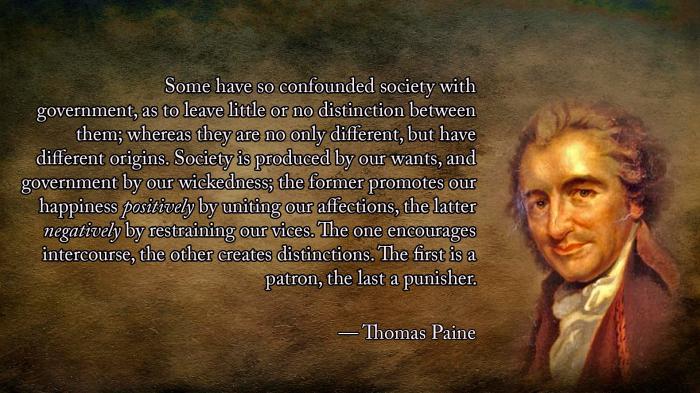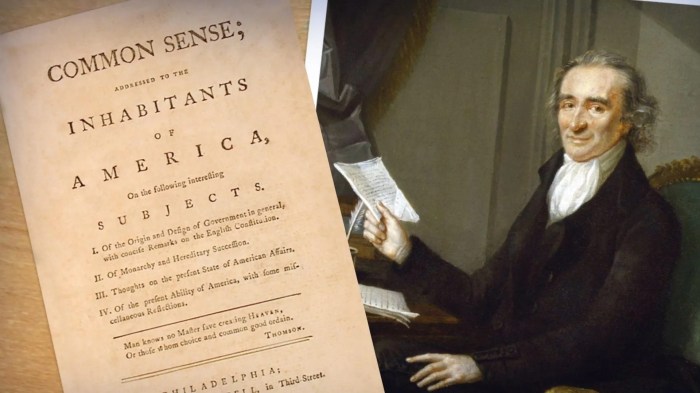Introducing the Thomas Paine Common Sense Answer Key, an essential resource for delving into the profound impact of Thomas Paine’s influential pamphlet, “Common Sense.” This key provides a comprehensive understanding of Paine’s groundbreaking work, exploring its key arguments, historical context, and enduring legacy.
Through this guide, we embark on a journey to unravel the significance of “Common Sense,” its role in shaping the American Revolution, and its lasting influence on political thought and activism.
Thomas Paine’s “Common Sense”

Thomas Paine’s “Common Sense” pamphlet, published in 1776, played a pivotal role in galvanizing support for American independence from British rule.
Paine’s pamphlet presented a compelling case for revolution, arguing that the American colonies had the right to self-determination and that the British monarchy was an oppressive and illegitimate institution.
Key Arguments
Paine’s key arguments in “Common Sense” included:
- Natural Rights:Paine asserted that all individuals are endowed with natural rights to life, liberty, and property.
- Social Contract:Paine argued that government is based on a social contract between the people and their rulers, and that if the government fails to protect the rights of the people, the people have the right to dissolve the contract.
- Tyranny of Monarchy:Paine denounced monarchy as an oppressive and irrational form of government, arguing that it was not based on the consent of the governed.
- Independence as a Necessity:Paine maintained that the American colonies had outgrown their dependence on Great Britain and that they were capable of governing themselves.
Impact of “Common Sense”
Thomas Paine’s “Common Sense” had a profound impact on the American Revolution. Its simple and straightforward language made it accessible to a wide audience, and its arguments for independence resonated with colonists who were increasingly frustrated with British rule.
Influence on Public Opinion
Prior to the publication of “Common Sense,” public opinion in the American colonies was divided on the issue of independence. However, Paine’s pamphlet helped to sway public opinion in favor of independence by presenting a clear and persuasive case for breaking away from Great Britain.
- Paine argued that the American colonies were capable of self-government and did not need to be ruled by a distant monarchy.
- He also appealed to the colonists’ sense of patriotism and their desire for freedom.
- “Common Sense” sold hundreds of thousands of copies and was widely read and discussed throughout the colonies.
Contribution to the Movement for Independence
In addition to influencing public opinion, “Common Sense” also played a direct role in the movement for independence. Paine’s pamphlet helped to galvanize support for the Continental Army and encouraged colonists to take up arms against the British.
- Paine’s arguments for independence were used by delegates to the Continental Congress to justify the Declaration of Independence.
- “Common Sense” also helped to inspire the colonists to fight for their freedom, and its ideas were echoed in many of the speeches and writings of the American Revolutionaries.
- The pamphlet’s impact was so great that it has been called “the spark that ignited the American Revolution.”
Key Ideas in “Common Sense”: Thomas Paine Common Sense Answer Key

Thomas Paine’s “Common Sense” presents several key ideas that had a profound impact on the American Revolution. These ideas were grounded in the philosophical and Enlightenment principles prevalent during that era.
Natural Rights
Paine argued that all individuals possess certain unalienable rights by virtue of their humanity. These rights include life, liberty, and the pursuit of happiness. He believed that these rights were bestowed by God and could not be taken away by any government.
Government by Consent
Paine asserted that governments derive their legitimacy from the consent of the governed. He argued that people have the right to create or alter their governments to ensure that they protect their natural rights.
Right to Revolution, Thomas paine common sense answer key
Paine argued that if a government fails to protect the rights of its citizens, the people have the right to overthrow it. He believed that revolution was justified when a government became oppressive or tyrannical.
Influence of Enlightenment Principles
Paine’s ideas were heavily influenced by the Enlightenment principles of reason, natural law, and individual liberty. He believed that human reason could be used to understand the world and create a better society.
Literary Style and Structure

Thomas Paine’s “Common Sense” is written in a clear, concise, and persuasive style that appealed to a wide audience. Paine uses simple language and avoids technical jargon, making his ideas accessible to readers of all backgrounds.
Use of Persuasive Techniques
Paine employs a variety of persuasive techniques to engage his readers and support his arguments. He uses:
- Emotional appeals:Paine appeals to the emotions of his readers by using vivid imagery and personal anecdotes to evoke a sense of urgency and inspire action.
- Logical arguments:Paine presents a series of logical arguments to support his claims, using evidence and reason to persuade his readers.
- Vivid imagery:Paine uses vivid imagery to create a lasting impression on his readers. He describes the horrors of war and the injustices of British rule in graphic detail to evoke a strong emotional response.
Historical Context
The publication of Thomas Paine’s “Common Sense” in 1776 was a pivotal moment in the American Revolution. It provided a clear and persuasive argument for American independence from British rule and helped to rally support for the cause of liberty.
The American colonies had been growing increasingly dissatisfied with British rule in the years leading up to the Revolution. The British government had imposed a series of taxes on the colonies without their consent, and had restricted their trade and manufacturing.
The colonists also resented the presence of British troops in their midst and the lack of representation in the British Parliament.
These grievances led to a growing movement for independence in the colonies. In 1774, the First Continental Congress was held in Philadelphia to discuss the situation. The Congress issued a Declaration of Rights and Grievances, which Artikeld the colonists’ complaints against British rule.
However, the British government refused to address the colonists’ concerns, and the movement for independence continued to grow.
The Publication of “Common Sense”
In January 1776, Thomas Paine published “Common Sense.” The pamphlet was an instant bestseller, selling over 100,000 copies in its first year. Paine’s pamphlet argued that the American colonies should declare their independence from Great Britain. He argued that the colonies were capable of governing themselves and that they would be better off without British rule.
“Common Sense” had a profound impact on the American Revolution. It helped to convince many colonists that independence was the right course of action. It also helped to unify the colonies and to create a sense of national identity.
Legacy of “Common Sense”
Thomas Paine’s “Common Sense” has left an enduring legacy in American history, shaping the course of political thought and activism in the United States.The pamphlet’s powerful arguments for independence from British rule inspired the American colonists to declare their independence and establish a new nation.
Its ideas continue to resonate today, influencing political debates and movements.
Influence on Political Thought
“Common Sense” articulated a radical and democratic vision of government, arguing that all men are created equal and have the right to govern themselves. These ideas laid the foundation for the American Revolution and the principles enshrined in the Declaration of Independence.The
pamphlet’s call for a representative government and the rejection of monarchy and aristocracy continue to shape American political thought. Its influence can be seen in the structure of the U.S. government, the concept of popular sovereignty, and the ongoing debates about the role of government in society.
Impact on Activism
“Common Sense” has also had a profound impact on political activism in the United States. Its clear and persuasive language has been used by activists throughout history to mobilize support for social and political causes.From the abolitionist movement to the civil rights movement, activists have drawn inspiration from “Common Sense” to challenge injustice and advocate for change.
Its arguments for reason, equality, and self-determination continue to resonate with activists today.
Essential Questionnaire
What is the central argument of Thomas Paine’s “Common Sense”?
Paine argued for American independence from British rule, advocating for the natural rights of individuals and the right to self-governance.
How did “Common Sense” contribute to the American Revolution?
The pamphlet’s widespread distribution and persuasive arguments significantly influenced public opinion, galvanizing support for independence and contributing to the movement for revolution.
What are some of the key ideas presented in “Common Sense”?
Paine emphasized the principles of natural rights, government by consent, and the right to revolution, drawing inspiration from Enlightenment philosophers.
How does Paine’s writing style contribute to the impact of “Common Sense”?
Paine employed persuasive techniques such as emotional appeals, logical arguments, and vivid imagery, making his ideas accessible and compelling to a wide audience.


